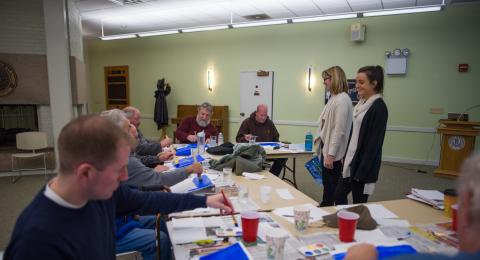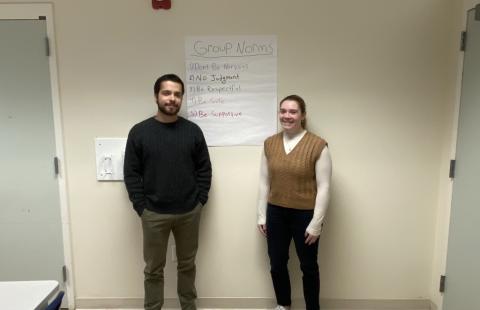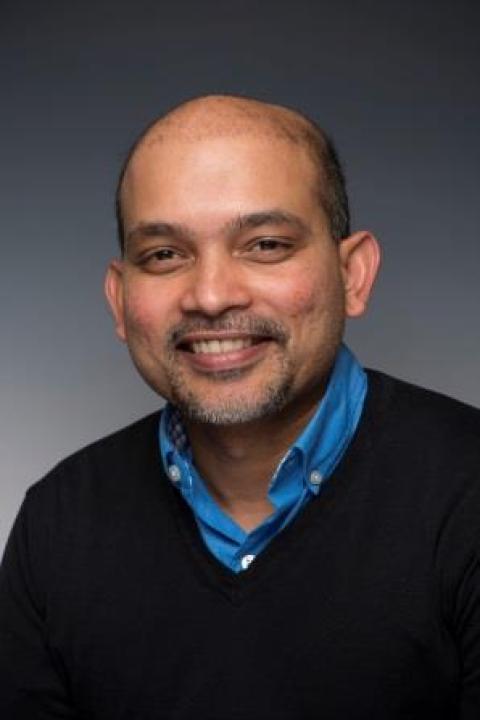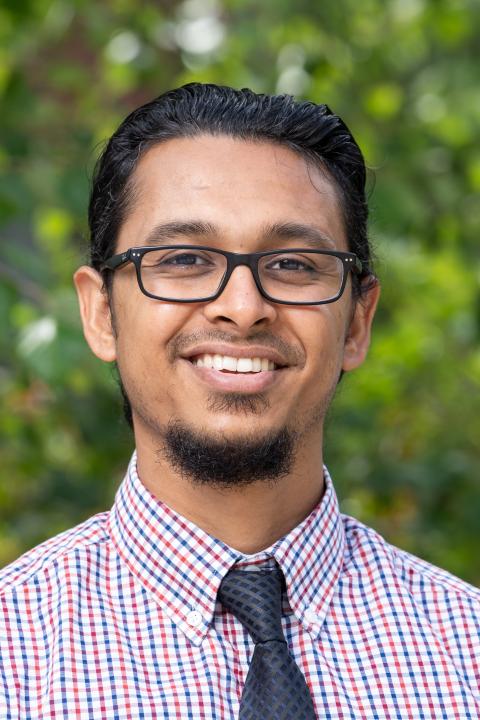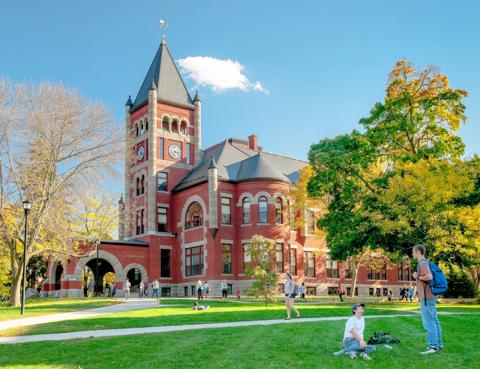Why get your entry-level doctoral degree in occupational therapy?
Students entering the Advanced Standing OTD program must be graduates of the UNH BS in Occupational Therapy program. An entry level doctoral degree in occupational therapy will prepare students to enter the profession with strong foundational skills in occupational therapy assessment and intervention, advanced training in clinical skills, leadership and advocacy, clinical research, and program development. Throughout the doctoral program, students will be challenged to learn and apply occupational therapy principles to traditional and emerging areas of practice, in hospital and community-based settings and for individual clients and population groups. Graduates gain valuable skills to become leaders in their field, advance in their careers, and position themselves as agents of change to influence policy and practice. Graduates of the Advanced Standing OTD program are eligible to sit for the national certification examination for the occupational therapist administered by the National Board for Certification in Occupational Therapy (NBCOT) to enter the profession.
Why choose UNH’s OTD program?
Our Occupational Therapy Doctorate (OTD) program is the perfect choice for students ready to elevate their careers through advanced clinical training and leadership preparation.
Pathway to Your Degree: Complete your OTD in just three years (nine semesters plus one January term) after the UNH BS in Occupational Therapy degree.
Innovative Learning: Our program is primarily offered in-person, ensuring hands-on, engaging experiences. Courses are delivered on our UNH Durham campus, creating a vibrant community of peers and faculty.
Expert Faculty, Personalized Mentorship: Learn directly from distinguished faculty mentors who bring clinical expertise and a commitment to evidence-based practice. With individualized guidance, you’ll gain the confidence and skills to excel in diverse practice settings.
The Doctoral Capstone Advantage: Through the doctoral capstone project, UNH OTD students engage in a mentored, in-depth project to develop advanced skills in a focused area of interest. Each student designs and completes an individualized project that may emphasize clinical practice, research, administration, leadership, program and policy development, advocacy, or education. With dedicated faculty mentorship and community partnerships, doctoral capstone projects allow students to transform their passions into meaningful contributions that advance the profession and create lasting impact.
Potential career areas
- Acute care
- Administration
- Early intervention programs
- Hand therapy clinics
- Hospitals
- In-patient rehabilitation centers
- Mental health and substance abuse programs
- Primary care settings
- School settings
- Skilled nursing facilities
- OT educator
- OT Clinical researcher
From the CHHS Blog
Curriculum & Requirements
UNH students who are in the BS program in occupational therapy may apply to enter into the Advanced-Standing OTD Program to complete an OTD Degree in Occupational Therapy to be eligible to enter the profession of occupational therapy. Because they have completed some of the professional courses as an undergraduate student at UNH, they earn their OTD Degree in Occupational Therapy in two full years (6 semesters, including 2 summers).
An entry level doctoral degree in occupational therapy will prepare you to enter the profession with strong foundational skills in occupational therapy assessment and intervention, advanced training in clinical skills, leadership and advocacy, clinical research, and program development. You will learn to evaluate, plan and provide intervention, and monitor the outcomes of clients facing a variety of illnesses, injuries, and disabilities such as autism, traumatic brain injury, stroke, substance abuse and musculoskeletal injuries. At UNH, you will learn and apply occupational therapy principles to traditional and emerging areas of practice, in hospital and community-based settings and for individual clients and population groups. Graduates gain valuable skills to become leaders in their field, advance in their careers, and position themselves as agents of change to influence policy and practice.
You would complete the Advanced-Standing OTD Program in 2 years (6 semesters) of professional courses to prepare for all areas of occupational therapy practice. The curriculum includes 24 weeks of full-time fieldwork. You also may choose to complete a graduate certificate in Assistive Technology to focus your education. Your education concludes with a 14-week doctoral capstone where you apply and expand your knowledge and take on leadership roles to develop a new program addressing specific client needs, conduct research, promote policy changes, or provide education.
After completing your degree, including fieldwork and the doctoral capstone, you will be eligible to sit for the National Board for Certification in Occupational Therapy examination to become a registered occupational therapist (OTR). In addition, all states require licensure in order to practice; however, state licenses are usually based on the results of the NBCOT Certification Examination. Note that a felony conviction may affect your ability to sit for the NBCOT certification examination or attain state licensure.
OTD Program Accreditation Status
The entry-level Occupational Therapy Doctoral Degree Program has been granted Candidacy Status by the Accreditation Council for Occupational Therapy Education (ACOTE) of the American Occupational Therapy Association (AOTA), located at 7501 Wisconsin Ave. Suite 510E, Bethesda, MD 20814. Tel. 301- 652-6611, Website: www.acoteonline.org. The program must have a preaccreditation review, complete an on-site evaluation, and be granted Accreditation Status before its graduates will be eligible to sit for the national certification examination for the occupational therapist administered by the National Board for Certification in Occupational Therapy (NBCOT). The UNH Program is scheduled for on-site evaluation in the fall of 2025, prior to a May 2026 graduation.
Admissions Information
Students who are completing the undergraduate portion of the UNH occupational therapy program declare their intent to apply to our Advanced Standing OTD program by the end of their sophomore year. They take professional courses as part of their baccalaureate degree requirements enabling them to enter the OTD program with Advanced Standing, with a full year of courses completed. Students officially apply to the Graduate School for the Advanced Standing OTD Program in the spring semester of their senior year, using an abbreviated process. Students should speak with their academic advisor regarding specific application requirements for writing a personal statement and letters of recommendation. An overall minimum grade point of B (3.0) is required for admission. Students must earn grades of B- or above in all OT courses at 700 level, with no more than 8 credits of B- or lower in OT courses (700 level or above).
Academic Standards and Policies
Retention in the OTD program reflects the same grade criteria required for entry and students must meet the professional behavior standards, which are explained in detail in the OT Department Policy and Procedure Manual, provided to all occupational therapy students. Because curriculum review and revision are undertaken annually, occupational therapy faculty work closely with students during academic advising sessions and share information about any policy and requirement changes during registration periods as well as throughout the academic year. Students are expected to take an active role in verifying expectations and requirements and should check with their departmental advisers each September for updated policies and requirements. Program requirements and policies for retention in the major are posted annually in the OT Department Policy and Procedure Manual, which is available on the OT department’s organization site on the Learning Management Platform, MyCourses.
The OTD is awarded at the completion of all academic coursework, meeting the above grade requirements, passing all competency (practical) exams as part of OT courses, passing all level I fieldwork requirements and receive a passing criterion score on the American Occupational Therapy Association Fieldwork Performance Evaluation for the Occupational Therapist in both 12-week Level II fieldwork experiences as well as successfully completing the doctoral capstone.
Students participate in a variety of off-campus and fieldwork experiences throughout the course of study and are covered with basic personal liability insurance through UNH for all practical components of the curriculum. Students are responsible for transportation to fieldwork sites and other off-campus learning experiences. Students are responsible for meeting the health and criminal record clearances established by their fieldwork sites and off-campus learning sites including capstone sites. Proof of immunization such as poliomyelitis, rubella, H1N1, and hepatitis B may also be required. For Level II fieldwork, health insurance and a physical examination, including a tuberculin test, are required. All fieldwork experiences are scheduled in centers approved by the Department of Occupational Therapy and with whom active Memoranda of Understanding with UNH exist. Fieldwork is planned collaboratively with the Academic Fieldwork Coordinator and capstone is planned with guidance from the Capstone Coordinator.
Occupational Therapy (Advanced Standing) OTD
| First Year | ||
|---|---|---|
| Summer | Credits | |
| OT 964 | Age Well: Occupational Therapy with Older Adults | 3 |
| OT 998 | Recent Advances in Neurological Evaluation and Intervention | 3 |
| Credits | 6 | |
| Fall | ||
| OT 845 | Administration and Management for Occupational Therapy Practice | 3 |
| OT 830 & 830L or OT 871 and OT 871L | Assistive Technology for Enhancing Occupational Performance or Enabling Participation in Community Groups and Enabling Participation in Community Groups Lab | 4 |
| OT 846 | Fieldwork and Professionalism-Level II | 1 |
| OT 860 & 860L & 860R | Psychosocial Evaluation and Intervention and Psychosocial Evaluation and Intervention Lab and Psychosocial Evaluation & Intervention Recitation | 4 |
| Required Elective or Grad Certificate Course | 4 | |
| Credits | 16 | |
| Spring | ||
| OT 854 | Level II Fieldwork, I | 8 |
| OT 855 | Level II Fieldwork Discussion | 1 |
| OT 856 | Level II Fieldwork, II | 8 |
| Credits | 17 | |
| Second Year | ||
| Summer | ||
| OT 901 | Introduction to Capstone | 2 |
| Credits | 2 | |
| Fall | ||
| OT 965 | Occupational Therapy Practice and Professional Reasoning | 3 |
| OT 975 | Leadership in OT Systems of Practice | 3 |
| OT 902 | Capstone Preparation | 3 |
| OT 983 | Engagement in Research | 3 |
| Credits | 12 | |
| Spring | ||
| OT 903 | Capstone: Project Implementation, Evaluation and Dissemination | 12 |
| Credits | 12 | |
| Total Credits | 65 | |
Degree Requirements
The OTD is awarded at the completion of all academic coursework, meeting grade requirements, passing all competency (practical) exams as part of OT courses, passing all level I fieldwork requirements and receive a passing criterion score on the American Occupational Therapy Association Fieldwork Performance Evaluation for the Occupational Therapist in both 12-week Level II fieldwork experiences as well as successfully completing the doctoral capstone. The following degree requirements assume completion of the UNH BS in Occupational Therapy degree.
Retention in the OTD program reflects the same grade criteria required for entry. Students must have grades of B- or above in all OT courses at the 700 level, with no more than 8 credits of B- or lower in OT courses (700 level or above).
| Code | Title | Credits |
|---|---|---|
| Required Courses | ||
| OT 830 & 830L | Assistive Technology for Enhancing Occupational Performance and Assistive Technology for Enhancing Occupational Performance Lab | 4 |
| or OT 871 & 871L | Enabling Participation in Community Groups and Enabling Participation in Community Groups Lab | |
| OT 845 | Administration and Management for Occupational Therapy Practice | 3 |
| OT 846 | Fieldwork and Professionalism-Level II | 1 |
| OT 854 | Level II Fieldwork, I | 8 |
| OT 855 | Level II Fieldwork Discussion | 1 |
| OT 856 | Level II Fieldwork, II | 8 |
| OT 860 & 860L & 860R | Psychosocial Evaluation and Intervention and Psychosocial Evaluation and Intervention Lab and Psychosocial Evaluation & Intervention Recitation 1 | 4 |
| OT 964 | Age Well: Occupational Therapy with Older Adults | 3 |
| OT 998 | Recent Advances in Neurological Evaluation and Intervention | 3 |
| OT 983 | Engagement in Research | 3 |
| OT 965 | Occupational Therapy Practice and Professional Reasoning | 3 |
| OT 975 | Leadership in OT Systems of Practice | 3 |
| OT 901 | Introduction to Capstone | 2 |
| OT 902 | Capstone Preparation | 3 |
| OT 903 | Capstone: Project Implementation, Evaluation and Dissemination | 12 |
| Elective or Graduate Certificate Course | 3-4 | |
- 1
OT 860, OT 860L, and OT 860R are required for students that have not taken OT 760, OT 760L, and OT 760R.
Program Learning Outcomes
Occupational Therapy OTD Entry-level Program Student Outcomes at the completion of the professional entry-level OTD Program, our graduates will:
- Demonstrate commitment and ability to use meaningful occupation for promoting health and well-being. Our curriculum emphasizes the idea that engagement in everyday occupations will lead to fulfillment of life roles and the promotion of health and well-being of individuals, communities, and populations. Our graduates are ready and dedicated to apply occupation-based evaluation and intervention techniques, and to share and expand authentic occupational therapy practice.
- Demonstrate professional attitudes and behaviors in their interactions with clients and others. Our graduates will be dedicated to ethical, client-driven practice demonstrating cultural sensitivity, integrity, honesty, compassion, and fairness. They will demonstrate respect for all persons with whom they work, appreciating and considering individual identities, priorities, abilities, and life experiences. They will be able to collaborate in intraprofessional and interdisciplinary teams within various settings, understanding the roles and expertise of other occupational therapists and other professionals.
- Demonstrate entry-level competencies as OT practitioners across diverse practice settings, skilled in the delivery evidence-based, occupation–centered evaluation and intervention techniques. Our graduates develop critical thinking skills and the capacity for creative clinical reasoning for providing client-centered, occupation-centered services. Graduates will apply a variety of evaluation methods for understanding a person’s occupational history, abilities, challenges and goals. They will apply occupation-centered intervention approaches and innovative technologies to address the needs of individuals and populations in traditional and emerging medical, educational, and other community-based practice settings.
- Demonstrate skills for translating research-to-practice and generating new knowledge grounded in occupational therapy practice. Our graduates will be skilled in identifying, critiquing, and synthesizing relevant research for delivering evidence-based services. Graduates will demonstrate capacity to translate research evidence to influence practice. They will have skills for contributing to the body of knowledge that supports and advances the profession.
- Demonstrate skills to become leaders and innovators as practitioners, researchers, advocates, educators, administrators, policy-makers, and entrepreneurs.Our graduates will apply leadership knowledge and skills, ethical reasoning, knowledge of policy and systems to be agents of change in diverse settings. Our graduates will be life-long learners and innovative thinkers committed to ongoing professional development. Our graduates will support and promote occupational justice for individuals, communities, and populations.
Professional Licensure/Certification Disclosures
The University of New Hampshire offers a number of academic programs designed to lead to professional licensure or certification in New Hampshire. However, completing a UNH degree/program does not guarantee professional licensure or certification. Eligibility may also depend on factors like years of work experience, professional examinations, passing a background check, and other criteria.
UNH does not guarantee that its professional licensure programs will satisfy the criteria of professional licensure boards in other states. Some states maintain different requirements for professional licensure or certification and requirements can change frequently. Federal regulations require the University to make public disclosure of certain information regarding professional licensure or certification programs, regardless of the modality the program is offered (i.e., in-person or online). The University provides guidance below but recommends students contact their state/territory licensing or certification board to ensure a program meets specific state/territory requirements.
Visit the Office of the Registrar's website for information about whether this program meets professional licensure requirements in your state.
Deadlines
Applications must be completed by the following deadlines in order to be reviewed for admission:
- Fall: N/A
- Spring: N/A
- Summer: April 1
- Special: N/A
Application fee: $65
Campus: Durham
New England Regional: CT MA RI
Accelerated Masters Eligible: No
New Hampshire Residents
Students claiming in-state residency must also submit a Proof of Residence Form. This form is not required to complete your application, but you will need to submit it after you are offered admission, or you will not be able to register for classes.
Transcripts
If you attended UNH or Granite State College (GSC) after September 1, 1991, and have indicated so on your online application, we will retrieve your transcript internally; this includes UNH-Durham, UNH-Manchester, UNH Non-Degree work and GSC.
If you did not attend UNH, or attended prior to September 1, 1991, then you must upload a copy (PDF) of your transcript in the application form. International transcripts must be translated into English.
If admitted, you must then request an official transcript be sent directly to our office from the Registrar's Office of each college/university attended. We accept transcripts both electronically and in hard copy:
- Electronic Transcripts: Please have your institution send the transcript directly to grad.school@unh.edu. Please note that we can only accept copies sent directly from the institution.
- Paper Transcripts: Please send hard copies of transcripts to: UNH Graduate School, Thompson Hall- 105 Main Street, Durham, NH 03824. You may request transcripts be sent to us directly from the institution or you may send them yourself as long as they remain sealed in the original university envelope.
Transcripts from all previous post-secondary institutions must be submitted and applicants must disclose any previous academic or disciplinary sanctions that resulted in their temporary or permanent separation from a previous post-secondary institution. If it is found that previous academic or disciplinary separations were not disclosed, applicants may face denial and admitted students may face dismissal from their academic program.
Letters of Recommendation: 2 Required
Recommendation letters submitted by relatives or friends, as well as letters older than one year, will not be accepted.
Personal Statement/Essay Questions
Brief essay, stating interest in continuing into the graduate program to enter the profession.
Resume
A current resume is required with your submitted application.
Additional Department Requirements
Prerequisite Course Verification Form (required): The regular program requires that all applicants print and complete the OT Prerequisite Course Verification Form. All prerequisites must be completed at the time of application. Please email the form to the UNH Graduate School. If you have questions about using the form, please contact Gabrielle.Petruccelli@unh.edu in the OT department. Students who have completed all prerequisites will be reviewed more favorably, however, students may apply while still completing prerequisite courses. All prerequisites must be completed before beginning the program in the Summer semester. Prerequisite courses may be completed at any accredited college or university.
OTD Program Prerequisites
Students who are currently in the UNH BS Occupational Therapy Program and applying to the Occupational Therapy Advanced Standing OTD Program should talk with their academic advisor in the Occupational Therapy Department regarding any questions on the application process.
A completed BA or BS degree. Applicants need a minimum overall grade point of 3.0 in undergraduate coursework and the following prerequisite courses:
- Human Anatomy and Physiology I & II (2 courses, both with required labs)
- Neuroanatomy (lab preferred)
- Clinical Kinesiology (lab preferred)
- Statistics
- Abnormal Psychology
- Medical Terminology
- Human Development
- *Coursework should include all stages of human development from birth through old age. This information may be covered in one lifespan course or multiple courses (i.e.:child development and adult development).
Students who have completed all prerequisites will be reviewed more favorably, however, students may apply while still completing prerequisite courses. All prerequisites must be completed before beginning the program in the Summer semester.
Prerequisite courses may be completed at any accredited college or university. Prerequisite course must be taken for college credit with a letter grade of B- or better.
The Occupational Therapy Department at UNH has applied for accreditation for an entry-level occupational therapy doctoral degree program and has been granted Candidacy Status by the Accreditation Council for Occupational Therapy Education (ACOTE) of the American Occupational Therapy Association (AOTA), located at 6116 Executive Boulevard, Suite 200, North Bethesda, MD 20852-4929. ACOTE’s telephone number c/o AOTA is (301) 652-AOTAand its Web address is www.acoteonline.org. The program must have a preaccreditation review, complete an on-site evaluation, and be granted Accreditation Status before its graduates will be eligible to sit for the national certification examination for the occupational therapist administered by the National Board for Certification in Occupational Therapy (NBCOT). The UNH Program is scheduled for on-site evaluation in the fall of 2025, prior to a May 2026 graduation.
Students must complete 24 weeks of Level II fieldwork within two years of completing professional program academic coursework. They must also complete an individual 14-week doctoral capstone experience within 12 months following the completion of all required coursework and Level II fieldwork as well as completion of preparatory capstone activities.
After completing all program requirements, students are eligible to sit for the national certification examination for the occupational therapist, administered by the National Board for Certification in Occupational Therapy (NBCOT). After successful completion of the NBCOT exam, the individual will be an Occupational Therapist, Registered (OTR). In addition, all states require licensure in order to practice; however, state licenses are usually based on the results of the NBCOT Certification Examination. Note that a felony conviction may affect a graduate’s ability to sit for the NBCOT certification examination or attain state licensure.
The UNH Occupational Therapy Department will accept applications from interested students with a baccalaureate degree in another area of study for entry into the OTD Program classes beginning in the Summer session.
UNH students enrolled in the BS/OTD Program will begin taking professional level courses as part of their BS degree and enter the OTD Program with Advanced Standing.
Important Notes
All applicants are encouraged to contact programs directly to discuss program-specific application questions.
International Applicants
Prospective international students are required to submit TOEFL, IELTS, or equivalent examination scores. English Language Exams may be waived if English is your first language. If you wish to request a waiver, then please visit our Test Scores webpage for more information.
